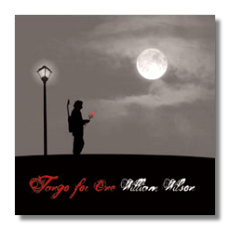
The Internet's Premier Classical Music Source
Related Links
- Latest Reviews
- More Reviews
-
By Composer
-
Collections
DVD & Blu-ray
Books
Concert Reviews
Articles/Interviews
Software
Audio
Search Amazon
Recommended Links
Site News
 CD Review
CD Review
Tango For One

- Ástor Piazzolla:
- Verano Porteño
- Otoño Porteño
- Invierno Porteño
- Primavera Porteño
- Libertango
- Balada para un Loco
- Escaulo
- Adiós Nonino
- Chiquilín de Bachín 1
- Milongo del Angel
- Oblivion
- Alberto Ginastera:
- Danzas Criollas I, III, and IV
- Triste 2
- Milonga
- Triste Pampeano
William Wilson, guitar and bandoneon
1 Jeff Basile, bass
2 Felix Olschofka, violin
GuitarSounds GSCD3010 DDD 56:23
The music of Ástor Piazzolla, inventor of the "tango neuvo," has been successfully performed in a multitude of arrangements. This is a testament to its flexibility and durability. Piazzolla's instrument of choice was the bandoneon, a German relative of the accordion that found its way to Argentina, and whose original purpose was to serve as a church organ (!) when none was otherwise available. (In no time it was slumming around the port of Buenos Aires, hanging out with the sailors and the prostitutes.)
On this CD, Piazzolla's music makes the transition to classical guitar very well; there are several tracks on which the bandoneon is also present. Both are played by William Wilson – via overdubbing obviously. According to guitarsounds.com, Wilson began studying classical guitar at age nine, continued his guitar studies at San Diego State University, and attended master classes with several prominent guitarists, including Christopher Parkening. This is his second solo CD for GuitarSounds. He has two additional recordings to his credit as a member of the Peter Pupping Quartet, and he is a guest artist on Pupping's solo Christmas CD.
In his very brief notes to the present release, Wilson writes that his mother is Argentine – like Piazzolla and Ginastera. He recognizes that the tango means more than just glitz and surface elegance, and the stereotype of a feline woman holding a flower in her mouth. (That's strictly for tourists.) "Here, there is desperation and loneliness," he writes. "Beneath the glitter and the fast movement of the dancers often there exists a soul that is in great longing for beauty and goodness. […] It is this yearning that I have tried to capture."
Wilson has been successful – this is a program in which beauty presses hard against melancholy. The lights should be turned down low to hear it, because this is not daytime music. The arranger is not credited, so I am going to assume that it is Wilson himself. While this is an atmospheric CD, and one that potently portrays the dark side of the tango, and of other popular dances associated with Argentina, it is not necessarily the best of example of what Piazzolla's music sounds like. For that, one needs to hear recordings – there are many of them – by Piazzolla himself. Piazzolla led and performed with ensembles of many sizes and types, and he well might have appreciated what Wilson has done here. For me, however, the true Piazzolla sound is more volatile and intense. Wilson might have been too mellow for him. The result is an excellent guitar CD, of which Wilson can and should be proud. (He acquits himself well on the bandoneon too.) As a Piazzolla CD, it is more questionable, but definitely an enjoyable one, within those limitations. (I don't associate Ginastera's music with the same ambiguity, so I have fewer reservations about Wilson's performance of those works.) Jeff Basile gives good support in Chiquilín de Bachín. Felix Olschofka comes off less well in Ginastera's Triste; he probably should not have been so close to the microphone. Otherwise, the engineering on this CD is as excellent as the playing.
Copyright © 2007, Raymond Tuttle


















